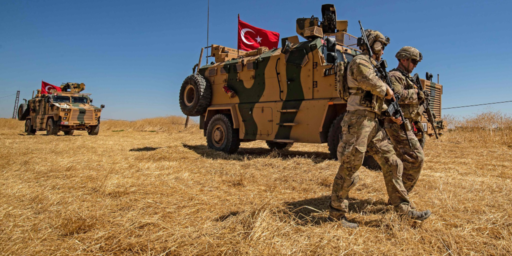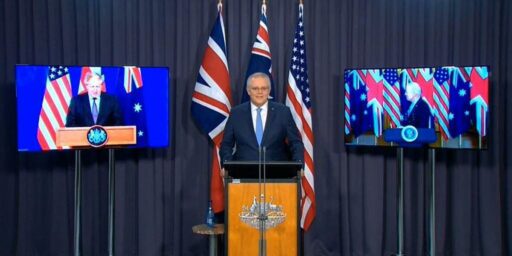BOOTS ON THE GROUND III
Robert Kagan joins the chorus, arguing that the fact the Administration is going to the U.N. for more help and working feverishly to Iraqify the policing function proves the need for more “boots.” Unfortunately, he sees both these efforts as likely failures at the cost of precious time:
The administration’s U.N. gambit will take more than a month and could well fail. The French government has, to say the least, no great interest in helping the United States out of the mess. Foreign Minister Dominique de Villepin has been writing poems in anticipation of the day when the Americans would come begging for help, and the price he and President Jacques Chirac want to exact in exchange will be exorbitant. Probably the French demands will be set deliberately so high as to preclude agreement. France’s strategy within Europe is not to save America’s bacon but to convince the European public that every leader who followed the United States into Iraq — and especially Tony Blair — should be thrown out on his ear.
The little secret, moreover, is that neither France nor any other of our leading NATO allies has more than a handful of troops to spare for Iraq. France and Germany are tapped out in missions in Africa, Afghanistan and the Balkans. The British and Spanish are tapped out in Iraq. Polish public opinion is already turning against the deployment in Iraq, and the mounting security problems in Iraq understandably discourage other countries from wanting to participate. The administration’s search for a U.N. resolution isn’t even aimed at getting European forces but at bringing in the larger forces available from Turkey, India and Pakistan. Never mind whether Turkish and Indian troops in Iraq are really the answer to all our problems in Iraq — or would instead become part of the problem themselves. The fact is, we may never get them. The Turkish public remains hostile to any deployment. The Indian government is reluctant to take part without a U.N. resolution. And the French have little interest in passing a U.N. resolution solely to help the Americans get Turkish and Indian troops to relieve the American burden in Iraq.
The administration’s hopes for getting a capable Iraqi force in place in a timely manner may be misplaced, too. Today there are about 37,000 Iraqi police officers spread around the country. The Bush administration plans to put 28,000 more on the streets — but only over the next 18 months. Even assuming all goes according to plan, this gradual increase in Iraqi capabilities is not going to make a big difference before next spring.
Kagan is right on both these fronts, although the possibility of Indian and African troops does exist. Still, I am still unsure what the precise task of the additional “boots” will be, given that they not only become an additional target set but create additional logistical headaches, given the tail-to-tooth ratios U.S. forces require. The problem remains subobtimal provision of certain specific skill sets–military police, civil affairs, psychological operations, Special Forces trainers, linguists, and the like–for which there are rather few boot-fillers available.





